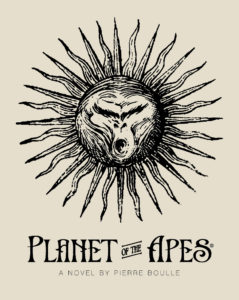
Previously: A literary eulogy
Next: Writer’s block
Earlier when I’ve paged through my past blog posts to locate my favorite for a particular year, one usually jumped out at me. For 2018, I find myself torn between two favorites. The tiebreaker in a case like this is: Do I have anything more to say on the subject?
On one hand is my write-up of Cat’s Cradle, a book I’ve adored and been fascinated with since I was young. I could easily write another 5,000 words on the many dimensions and subtleties of Vonnegut’s greatest work—yes, even greater than Slaughterhouse-Five. For the purposes of this series (a look back on my favorite posts over the last ten years), I’m willing to stand pat. My 2018 post doesn’t express everything I could say about the novel, but it touches on what I think are its most salient aspects.
The other post from 2018 I’m proud of regards Planet of the Apes—the original 1968 film, and not any of the sequels in what has become a rather exhausted movie franchise. I opened that write-up copping to the film being “a guilty pleasure,” that it is
campy, riveting, preachy, and provocative— Franklin J. Schaffner’s sci-fi classic is the very definition of middle-brow entertainment, in that it pleases the senses while challenging the mind.
It turns out that, yes, I do have a little more to say on the subject.
Often when I gear up to write about a book, I’ll go back and re-read it so it’s fresh in my mind. For my Apes post, I didn’t re-watch the movie, but rather read Pierre Boulle’s original 1963 novel, which I’d never picked up before. I didn’t spend too much time discussing the book, though, since my focus was on the film. That’s a shame, because the novel is quite the curiosity.
Boulle dismissed attempts to label his Apes as science-fiction, preferring to call it a “social fantasy.” The term comes across like a hipster pose, but it makes sense. Much as Gulliver’s Travels isn’t really about seafaring, the interstellar aspect of Apes is a literary contrivance for explaining how his character Ulysee winds up in a society run by simians.
Structurally, the book reads something like utopian literature. In works such as Ecotopia, The Dispossessed, or, obviously, Thomas More’s Utopia, the narrative is not centered around character(s) dropped into a tight situation and navigating conflicts toward some kind of resolution. Rather, utopian works spool out pages of exposition to detail the clockwork innards of a fictional society operating on principles quite different from our own.
Boulle likewise spends many precious pages explaining how the simians live, work, compete, and cooperate. So, is Planet of the Apes a utopian novel? It’s not so simple. As with the film, the human astronaut Ulysee is feared by the simians, who view his existence as a threat to their comprehension of the universe. Their plans for him are not kind.
While that might make the book sound dystopian instead, that’s a difficult label too. Prior to Ulysee falling from the sky onto their planet, things seem to be going pretty well for the apes. Their society isn’t bleak or oppressive or authoritarian. They merely have an all-too-recognizable reaction to the unexplainable, this human that talks and reasons, a creature they normally hunt for sport and trophy.
The genius of Boulle’s book is that it’s structured like a utopian novel, but instead of describing an alternate society, it describes our society, with humans swapped out for apes. (Unlike the film, the apes of the novel live in a mid-twentieth century world, with cars, telephones, and even tobacco.) Boulle’s clever twist permitted him to write about our world as though it was an exotic place. In the terminology of critical theory, it defamiliarized our society. That, in turn, permitted him to write about us from a distance. As with the movie series, the ape device became a powerful fulcrum for criticizing all manner of human activity, from animal cruelty to racism, from religion to capitalism.
I remain surprised how under-appreciated the book is today—another sad example of a successful Hollywood adaptation smothering out its source material.
From Chimpan-A to Chimpanzee: The Swiftian genius of Planet of the Apes

